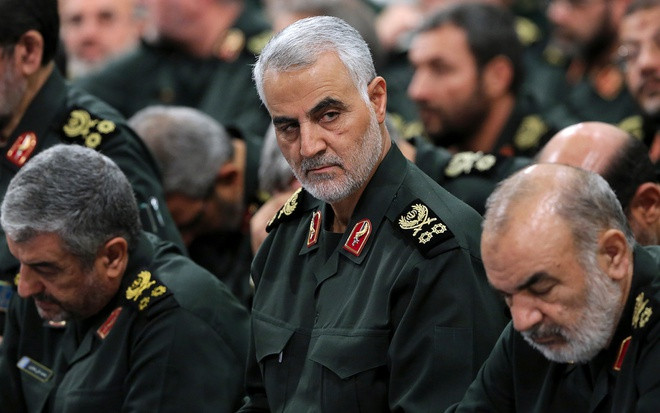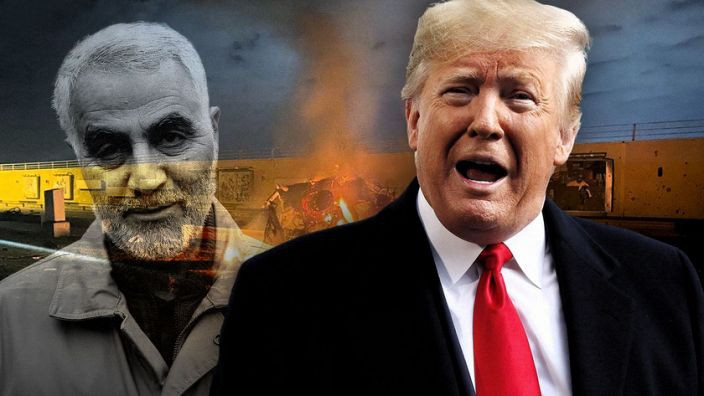By assassinating General Soleimani, the US President is 'playing' an extremely dangerous gamble
The airstrike that killed General Soleimani was perhaps the most dangerous gamble President Trump has ever made with his own political future.
Two days into 2020 - a crucial year for his re-election as President, Mr. Trump - who has always opposed US wars in the Middle East - has dragged the United States into another war with unpredictable consequences.
|
| The airstrike that killed General Soleimani was perhaps the most dangerous gamble President Trump has ever made with his own political future. Photo: Yahoo News |
By killing the commander of the Quds Force of the Iranian Revolutionary Guard Corps (IRGC), General Qasem Soleimani, in Iraq, President Trump has brought the United States closer to open conflict, but he claims he can prevent the kind of all-out war with Iran that would shock the national security and economy of the United States and the world.
But with Iran’s easy access to soft targets, the Middle East and even Europe could become less safe for Americans, including the US troops Mr. Trump wants to bring home.
The risk of escalation was clearly seen when a US defense official said that the US would deploy 3,000 more troops to the Middle East, of which 750 soldiers were deployed to protect the US Embassy in Baghdad.
The risk of bloodshed in the Middle East
It is still too early to know whether General Soleimani’s death will significantly weaken Iran or improve America’s strategic position, whether it will spark a major regional conflict, and how it will impact Mr. Trump’s political future and legacy.
It is also unclear how it will change the political landscape inside Iran, where the Islamic Republic's government is beset by economic crisis and protests in many parts of the country.
However, Iran certainly considers the assassination of one of its most important political leaders an act of war, so revenge will certainly not be “simple”.
“There will certainly be unintended consequences, and I think it's better that our embassies are heavily protected,” former US Ambassador to Iraq Christopher Hill told CNN.
“Iran simply will not let this go unanswered. There will be a response and I fear there will be bloodshed in many places,” added Christopher Hill.
Recent history is marked by shocking and horrifying US actions in conflicts in Iraq and Afghanistan that brought short-term satisfaction but long-term political and military disasters. A full-scale conflict with Iran would be far more complicated than either of those.
Iran's revenge
The airstrike that killed General Soleimani may have been the most significant calculated action by the United States in the 40-year Cold War with Iran.
With Soleimani frequently traveling to Iraq, Syria, and other parts of the Middle East, this would not be the first time he would be in a place that is in the US “tracing zone.” However, previous US presidents, perhaps fully aware of the consequences of provoking war with Iran, chose not to act. In the coming days, the Trump administration will have to explain why it chose to act now.
 |
| General Soleimani - who was just killed in a US airstrike. Photo: AP |
When Mr. Trump took office, there was no immediate crisis between the United States and Iran. By withdrawing from the nuclear deal, strangling Iran’s economy, and now killing General Soleimani, Mr. Trump has brought confrontation back into focus. This latest move will also dash any hope that the United States and Iran can resolve their differences through dialogue.
It was a big gamble. But as history shows, presidents who have bet their careers on the Middle East have often lost.
Analysts in the coming days will continue to examine whether General Soleimani's death has caused the IRGC's Quds Force to lose its cohesion and whether it can undermine its regional power, at least in the short term.
However, the killing of General Soleimani is a strong blow to Iran because this Quds Force Commander has an important role in Iran's great influence in the region. And Iran declared that it will "take revenge".
It remains unclear how Iran would respond. However, with a network of proxies from Hezbollah to Hamas, Iran has the ability to launch a swift and powerful attack against US allies like Israel and Saudi Arabia, as well as US assets and personnel in the region.
Iran could also impact the global economy by attacking oil tankers in the Strait of Hormuz. Top US officials and military officials could be easy targets when traveling abroad…
US troops in Iraq, Syria and Afghanistan may be particularly vulnerable to attacks by forces allied with Iran. Politically, the Iraqi government may have no choice but to ask US forces to leave the country after the airstrike on Baghdad International Airport.
Risking it all with the goal of re-election
The airstrike that killed the Iranian general, personally ordered by President Trump, could reshape the dynamics of the US presidential race, opening a path for Democrats to run as anti-war candidates – a stance that helped elect the last two US presidents, Donald Trump and Barack Obama.
Democratic candidate Bernie Sanders posted a video on January 3 declaring he would do everything possible “to prevent a war with Iran.”
“If you thought the war in Iraq was a disaster, I guess the war in Iran would be even worse,” said the Vermont senator.
Democratic frontrunner Joe Biden would likely be the biggest beneficiary if President Trump's Iran gamble fails.
The former US Vice President has proposed testifying about Soleimani's record of inciting unrest and bloodshed, but he also added that President Trump just lit the fuse.
“He owes the American people an explanation of his strategy and plans for ensuring the safety of our troops, embassy personnel, citizens and interests both at home and abroad, as well as our partners in the region,” Mr. Biden said.

